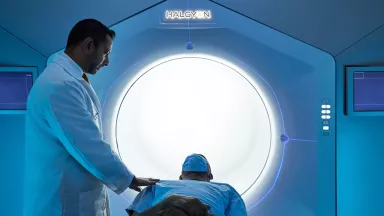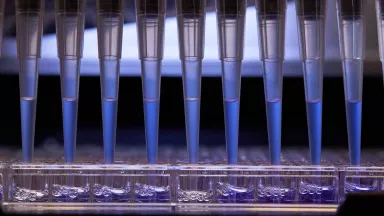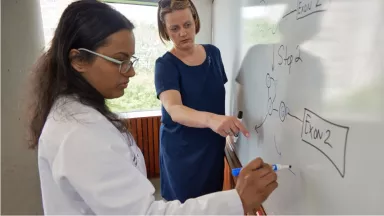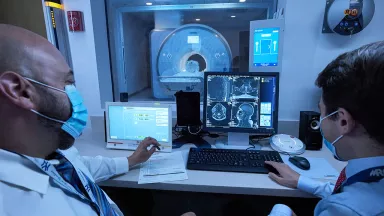Thyroid Cancer Screening
Detecting cancer in its earliest stage offers the best chance of successful treatments. That’s why Montefiore Einstein Comprehensive Cancer Center is passionate about cancer awareness, screenings and prevention. It is important to understand the potential risks and benefits of thyroid cancer screenings and to have them performed when recommended at our NCI-designated comprehensive cancer center.
Cancer of the thyroid gland is one of the most common types of endocrine system cancers. Catching and treating thyroid cancer as early as possible increases your chances of curing the disease. There are screening tests that may identify signs of the condition. Talk to your doctor about screening tests that are right for you.
Meet the multidisciplinary team at Montefiore Einstein Comprehensive Cancer Center that specializes in diagnosing and treating thyroid cancer and learn more about thyroid cancer treatment.
For more than 50 years, Montefiore Einstein Comprehensive Cancer Center has been a leader in the research, diagnosis and treatment of over 200 types of cancer. Turn to us for comprehensive cancer screening.
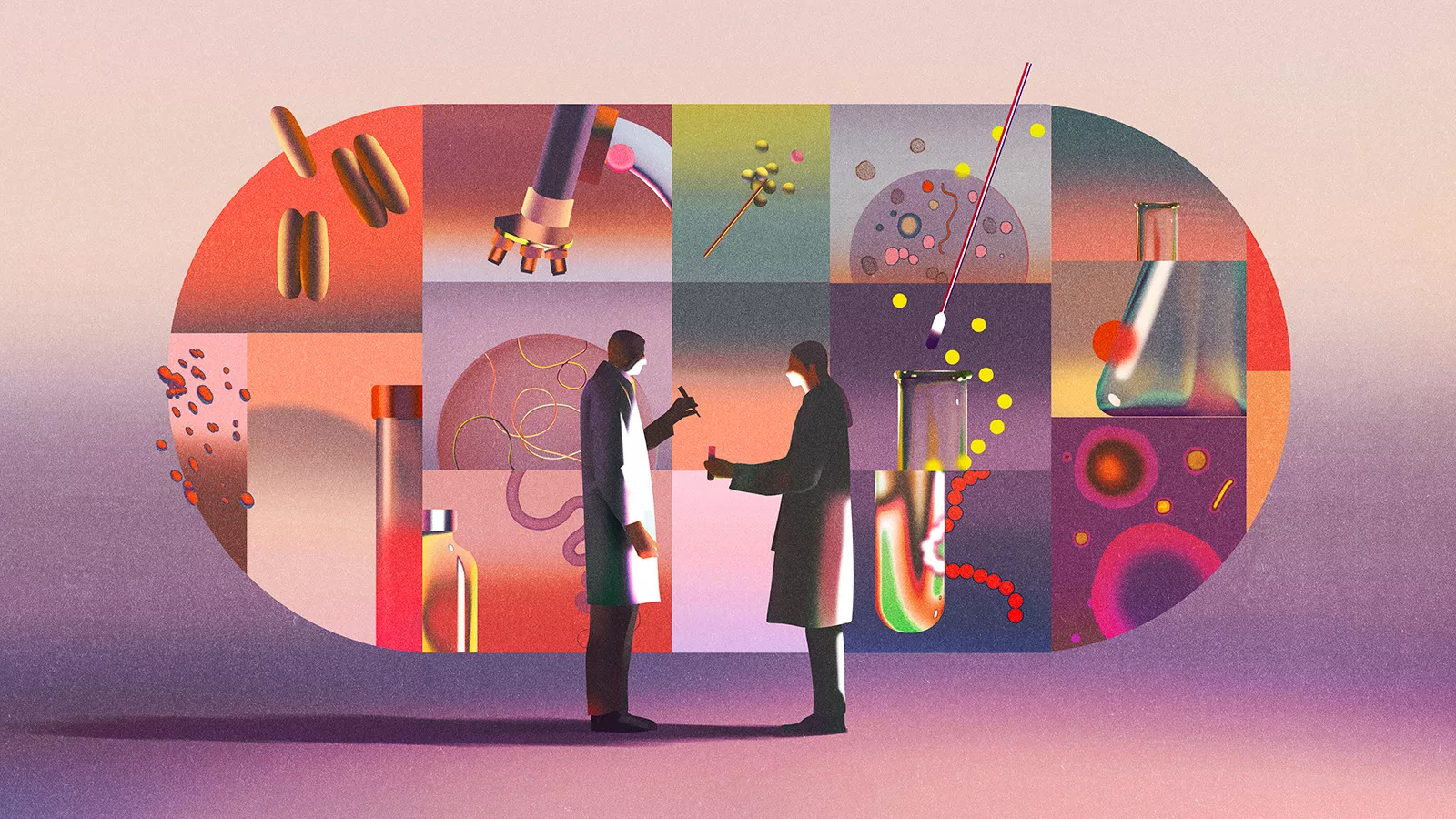
Cancer Clinical Trials
- Blood & Bone Marrow Cancers
- Brain, Spine & Central Nervous System Cancers
- Breast Cancer
- Childhood Cancers
- Endocrine System Cancers
- Gastrointestinal (GI) Cancers
- Genitourinary (GU) & Urologic Cancers
- Gynecologic Cancers
- Head & Neck Cancers
- Kaposi Sarcoma & AIDS-Related Cancers
- Lung & Chest Cancers
- Prostate Cancer
- Sarcomas
- Skin Cancer
As an NCI-designated comprehensive cancer center, Montefiore Einstein Comprehensive Cancer Center supports the mission and guidelines of the National Cancer Institute (NCI). The following information about types of cancer, prevention and treatments is provided by the NCI.
Thyroid Cancer Screening (PDQ®)–Patient Version
What Is Screening?
Screening is looking for cancer before a person has any symptoms. This can help find cancer at an early stage. When abnormal tissue or cancer is found early, it may be easier to treat. By the time symptoms appear, cancer may have begun to spread.
Scientists are trying to better understand which people are more likely to get certain types of cancer. They also study the things we do and the things around us to see if they cause cancer. This information helps doctors recommend who should be screened for cancer, which screening tests should be used, and how often the tests should be done.
It is important to remember that your doctor does not necessarily think you have cancer if he or she suggests a screening test. Screening tests are given when you have no cancer symptoms.
If a screening test result is abnormal, you may need to have more tests done to find out if you have cancer. These are called diagnostic tests.
General Information About Thyroid Cancer
Key Points
- Thyroid cancer is a disease in which malignant (cancer) cells form in the tissues of the thyroid gland.
- Thyroid cancer is found more often in women.
- Being exposed to radiation increases the risk of thyroid cancer.
Thyroid cancer is a disease in which malignant (cancer) cells form in the tissues of the thyroid gland.
The thyroid is a gland at the base of the throat near the trachea (windpipe). It is shaped like a butterfly, with a right lobe and a left lobe. The isthmus, a thin piece of tissue, connects the two lobes. A healthy thyroid is about the size of a walnut. It usually cannot be felt through the skin.
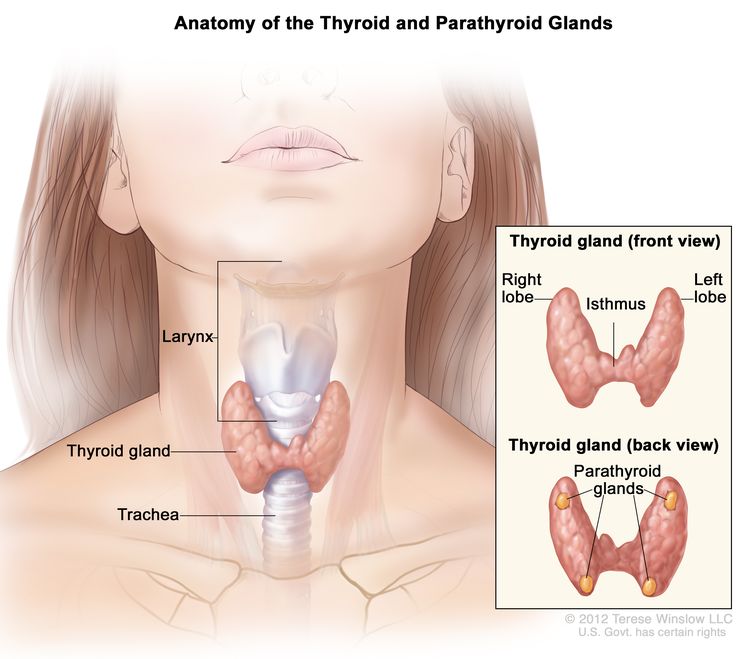
Anatomy of the thyroid and parathyroid glands. The thyroid gland lies at the base of the throat near the trachea. It is shaped like a butterfly, with the right lobe and left lobe connected by a thin piece of tissue called the isthmus. The parathyroid glands are four pea-sized organs found in the neck near the thyroid. The thyroid and parathyroid glands make hormones.
The thyroid uses iodine, a mineral found in some foods and in iodized salt, to help make several hormones. Thyroid hormones do the following:
- control heart rate, body temperature, and how quickly food is changed into energy (metabolism)
- control the amount of calcium in the blood
Learn more about thyroid cancer at Thyroid Cancer Treatment.
Thyroid cancer is found more often in women.
Thyroid cancer is most often diagnosed in men and women aged 55 to 64 years. Women are about three times more likely than men to have thyroid cancer.
The number of people diagnosed with thyroid cancer in the United States increased from 1974 to 2013, but the number of deaths from thyroid cancer has stayed the same or decreased slightly. Rates of thyroid cancer leveled off from 2013 to 2016, and there was a decrease in the rate of thyroid tumors less than 1 centimeter in size. Most cases of thyroid cancer respond to treatment and are usually cured.
Being exposed to radiation increases the risk of thyroid cancer.
Anything that increases a person's chance of getting a disease is called a risk factor. Not every person with one or more of these risk factors will develop thyroid cancer, and it will also develop in some people who don't have any known risk factors. Talk with your doctor if you think you may be at risk.
Risk factors for thyroid cancer include:
- Being exposed to radiation to the head and neck as an infant or child or being exposed to radiation from a radioactive fallout. The cancer may occur as soon as 5 years after exposure.
- Having a family history of thyroid disease or thyroid cancer.
- Having a history of goiter (enlarged thyroid).
- Having a genetic condition such as multiple endocrine neoplasia type 2 syndrome (MEN2), which is caused by a change in the RET gene.
- Being female.
- Being Asian.
Thyroid Cancer Screening
Key Points
- Tests are used to screen for different types of cancer when a person does not have symptoms.
- There is no standard or routine screening test for thyroid cancer.
- Screening for thyroid cancer may not help a person live longer.
- Screening tests for thyroid cancer are being studied in clinical trials.
Tests are used to screen for different types of cancer when a person does not have symptoms.
Scientists study screening tests to find those with the fewest harms and most benefits. Cancer screening trials also are meant to show whether early detection (finding cancer before it causes symptoms) helps a person live longer or decreases a person's chance of dying from the disease. For some types of cancer, the chance of recovery is better if the disease is found and treated at an early stage.
There is no standard or routine screening test for thyroid cancer.
There is no standard or routine screening test used for early detection of thyroid cancer. Thyroid cancer that does not cause symptoms may be found during:
- a routine physical exam when the doctor checks a person's neck for lumps (nodules) or swelling in the neck, voice box, and lymph nodes, or anything else that seems unusual
- a surgery that is done for another condition
- an ultrasound that is done for another condition
Screening for thyroid cancer may not help a person live longer.
Studies have shown that screening for thyroid cancer does not decrease the chance of dying from the disease. No randomized clinical trials have been done in the United States to find out if a neck exam, ultrasound, or other screening test decreases the risk of dying from thyroid cancer. Neck exams and ultrasound are sometimes used to screen for thyroid cancer but do not decrease the risk of dying from the disease.
Screening tests for thyroid cancer are being studied in clinical trials.
Information about clinical trials supported by NCI can be found on NCI’s clinical trials search webpage. Clinical trials supported by other organizations can be found on the ClinicalTrials.gov website.
Risks of Thyroid Cancer Screening
Key Points
- Screening tests have risks.
- The risks of thyroid cancer screening include:
- Finding thyroid cancer that may never cause symptoms or become life threatening.
- False-negative test results can occur.
- False-positive test results can occur.
Screening tests have risks.
Decisions about screening tests can be difficult. Not all screening tests are helpful, and most have risks. Before having any screening test, you may want to discuss the test with your doctor. It is important to know the risks of the test and whether it has been proven to reduce the risk of dying from cancer.
The risks of thyroid cancer screening include:
Finding thyroid cancer that may never cause symptoms or become life threatening.
When a screening test result leads to the diagnosis and treatment of a disease that may never have caused symptoms or become life-threatening, it is called overdiagnosis. Diagnostic tests (such as a fine-needle aspiration biopsy) and cancer treatments (such as surgery and radioactive iodine therapy) can have serious risks, including physical and emotional problems.
False-negative test results can occur.
Screening test results may appear to be normal even though thyroid cancer is present. A person who receives a false-negative test result (one that shows there is no cancer when there really is) may delay seeking medical care even if there are symptoms.
False-positive test results can occur.
Screening test results may appear to be abnormal even though no cancer is present. A false-positive test result (one that shows there is cancer when there really isn't) can cause anxiety and is usually followed by more tests and procedures (such as a fine-needle aspiration biopsy), which also have risks.
About This PDQ Summary
About PDQ
Physician Data Query (PDQ) is the National Cancer Institute's (NCI's) comprehensive cancer information database. The PDQ database contains summaries of the latest published information on cancer prevention, detection, genetics, treatment, supportive care, and complementary and alternative medicine. Most summaries come in two versions. The health professional versions have detailed information written in technical language. The patient versions are written in easy-to-understand, nontechnical language. Both versions have cancer information that is accurate and up to date and most versions are also available in Spanish.
PDQ is a service of the NCI. The NCI is part of the National Institutes of Health (NIH). NIH is the federal government’s center of biomedical research. The PDQ summaries are based on an independent review of the medical literature. They are not policy statements of the NCI or the NIH.
Purpose of This Summary
This PDQ cancer information summary has current information about the screening of thyroid cancer. It is meant to inform and help patients, families, and caregivers. It does not give formal guidelines or recommendations for making decisions about health care.
Reviewers and Updates
Editorial Boards write the PDQ cancer information summaries and keep them up to date. These Boards are made up of experts in cancer treatment and other specialties related to cancer. The summaries are reviewed regularly and changes are made when there is new information. The date on each summary ("Updated") is the date of the most recent change.
The information in this patient summary was taken from the health professional version, which is reviewed regularly and updated as needed, by the PDQ Screening and Prevention Editorial Board.
Clinical Trial Information
A clinical trial is a study to answer a scientific question, such as whether one treatment is better than another. Trials are based on past studies and what has been learned in the laboratory. Each trial answers certain scientific questions in order to find new and better ways to help cancer patients. During treatment clinical trials, information is collected about the effects of a new treatment and how well it works. If a clinical trial shows that a new treatment is better than one currently being used, the new treatment may become "standard." Patients may want to think about taking part in a clinical trial. Some clinical trials are open only to patients who have not started treatment.
Clinical trials can be found online at NCI's website. For more information, call the Cancer Information Service (CIS), NCI's contact center, at 1-800-4-CANCER (1-800-422-6237).
Permission to Use This Summary
PDQ is a registered trademark. The content of PDQ documents can be used freely as text. It cannot be identified as an NCI PDQ cancer information summary unless the whole summary is shown and it is updated regularly. However, a user would be allowed to write a sentence such as “NCI’s PDQ cancer information summary about breast cancer prevention states the risks in the following way: [include excerpt from the summary].”
The best way to cite this PDQ summary is:
PDQ® Screening and Prevention Editorial Board. PDQ Thyroid Cancer Screening. Bethesda, MD: National Cancer Institute. Updated <MM/DD/YYYY>. Available at: https://www.cancer.gov/types/thyroid/patient/thyroid-screening-pdq. Accessed <MM/DD/YYYY>.
Images in this summary are used with permission of the author(s), artist, and/or publisher for use in the PDQ summaries only. If you want to use an image from a PDQ summary and you are not using the whole summary, you must get permission from the owner. It cannot be given by the National Cancer Institute. Information about using the images in this summary, along with many other images related to cancer can be found in Visuals Online. Visuals Online is a collection of more than 3,000 scientific images.
Disclaimer
The information in these summaries should not be used to make decisions about insurance reimbursement. More information on insurance coverage is available on Cancer.gov on the Managing Cancer Care page.
Contact Us
More information about contacting us or receiving help with the Cancer.gov website can be found on our Contact Us for Help page. Questions can also be submitted to Cancer.gov through the website’s E-mail Us.
Updated:
Source URL: https://www.cancer.gov/node/1106239/syndication
Source Agency: National Cancer Institute (NCI)
Captured Date: 2018-02-08 00:10:28.0


